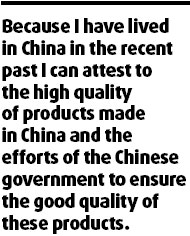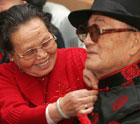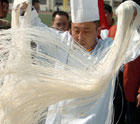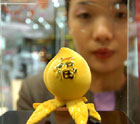Science and technological breakthroughs; a booming economy; growing strength in international politics; aid to developing nations - hardly a day passes without a mention of China in the news in Nigeria.
However, not all of the news goes down well with the people.

Relations between Nigeria and China go back several years. I was able to confirm this recently when I noticed that the porcelain toilets in my 35-year-old university building are all made in China and have weathered the years.
It is very likely that Nigeria's imports from China started even before China opened up to the international community.
A Chinese, Cha Chi-ming from Hong Kong, was a pioneering industrialist in the textile industry in Nigeria, producing quality wax materials and employing hundreds of Nigerians. He died in March this year at the age of 93.
Because I have lived in China in the recent past I can attest to the high quality of products made in China and the efforts of the Chinese government to ensure the good quality of these products.
I also know that products in China are tailored for the masses and therefore are low-priced.
Many of these products can be found in Nigeria and because of weather conditions and frequent use, they rapidly deteriorate. But beyond this many substandard products also enter the country, but not necessarily from China.
Some could have been manufactured locally and stamped Made-in-China. Therefore it is not uncommon in Nigeria to hear consumers complain about the low quality of products from China.
I have on several occasions tried to put right this erroneous belief. To buttress my defense I use the recently launched Nigeria Communication Satellite, produced and launched by China, and several Chinese products that are well suited to our country, for example, the Jincheng motorcycle.
If Chinese products were that bad, then why do we see so many Nigerian officials visiting China to woo investors.
However, the Nigerian government is becoming increasingly concerned about the alarming rate at which unregistered, counterfeit and smuggled products are entering the country.
It appears some dubious Nigerian businessmen collude with their Chinese counterparts to perpetrate this illicit trade. This trade cuts across several products, including textiles, drugs, computer soft and hardware, household appliances and many more.
In late 2006 "China town", a sprawling business district in Lagos, Nigeria was closed down by the Nigerian Customs. The explanation: It was a haven for smuggled products, especially clothing and shoes.
During the period "China town" was shut down, many Nigerians and Chinese traders were made jobless.
This month the Nigerian food and drug control agency announced a ban on all imported toothpaste. It specifically mentioned those imported from China because they contained Ethyl glycol, an anti-freeze that causes cancer.

However, the recent effort of the Chinese government in curbing the activities of illegal manufacturers and traders needs to be praised.
A few weeks ago the Chinese public security bureau in collaboration with private organizations and some international agencies raided syndicates in southern China and seized counterfeit computer software.
The syndicates had been identified with the distribution of more than $2 billion worth of Microsoft software to more than 27 countries, including Nigeria.
It will be worthwhile if the Chinese government could extend this type of clampdown to other products such as drugs, textiles, home appliances and electronics.
Few Nigerians have the opportunity to visit China to confirm that goods made there are not necessarily of low quality.
A majority of Nigerians only know China through the products imported from that country. To this majority they should be able to purchase quality products that enter the country through legal means.
Although checking most products imported into Nigeria lies with Nigerian Customs, the combined effort of this agency and the Chinese agencies for quality control and export/import licenses will yield better results.
Nigeria has an estimated population of 150 million people, and offers a huge market manufacturers cannot afford to ignore.
The author is with the Department of Animal Science in the Faculty of Agriculture at Obafemi Awolowo University, Nigeria.













